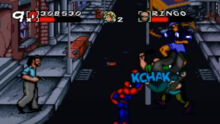Marvel Snap Spider-Verse Season Could Make The Worst Deck Into One Of The Best
Movement-based decks are almost never seen in high-level play, but that might be changing soon thanks to some powerful new tools.
The lowly Move deck. One of the core deck archetypes in Marvel Snap has long been starved for new tools, forcing it to languish near the bottom and mid-tier ranks. That could all be changing with the next season, a loose tie-in with Spider-Man: Across the Spider-Verse called (what else) Spider-Versus. As a match for the wallcrawler's legendary agility, this next season looks squarely focused on movement-based abilities, and that could shake up the meta in ways we haven't seen since the game launched.
Move decks are some of the earliest archetypes you gain in Marvel Snap, earning most of the major tools while still at a relatively low rank. They make for a good learning tool--Snap is a zone-control game at its heart, so movement-based abilities help illustrate the core mechanics and give beginning players their first taste of a tricky strategy that can make good use of bluffs. Experienced Move deck players know not just when to play Heimdall as their big finisher, but also when not to, letting their opponent overcommit to a location that isn't really being contested.
All that said, movement-based decks haven't remained viable for high-level play. Perhaps because movement is such an obviously strong ability for a zone-control game, developer Second Dinner has been incredibly scarce with adding new movement-based cards. The very first season pass when it came out of beta was Symbiote Invasion, which introduced Miles Morales. Miles is a decent enough Move staple, with a huge cost reduction if another card has moved. More recently Snap introduced Jeff, an adorable little shark who can move anywhere regardless of effects that restrict movement. He's seen plenty of play, but not in movement-based decks. Instead, Jeff mostly exists as a tech card to counter other popular strategies revolving around Spider-Man and Professor X, who otherwise lock down locations.
So for months, that's been the status of movement-based cards: fine for beginners, but almost never seen in high-level play. It's been exacerbated by almost every other major deck archetype, like Discard, Destroy, or Buff decks getting a steady supply of new tools that help them continue to compete. Sometimes a new card will even introduce an entirely new archetype, like we saw with the recent popularity of High Evolutionary decks.
All of which brings us to the upcoming Spider-Versus season. The new season doesn't just add piecemeal additions to movement-based decks--it seems to be based almost entirely on Move abilities. The season pass card, Ghost Spider, can thwip the last card you played to its location. That makes her a perfect way to activate movement-based cards like Human Torch or Vulture, bail a card out of a losing position, or even just bluff your opponent. Her ability also crucially lets you move cards to the right, whereas most movement-based abilities go left, making them more predictable.
But on top of Ghost Spider, even more big Move cards will be dropping throughout the season. Silk is a utility card that darts around the battlefield whenever any card is played at her location, great for activating cards like Kraven or moving to usually out-of-reach places like Death's Domain. And perhaps the most impactful card of the set is Spider-Man 2099, which destroys a card when moved to a new location. Paired with Ghost Spider, this effectively lets you target a big enemy minion that your opponent may think has a location locked down, like Darkhawk or Dracula. (The fourth new card, Spider-Ham, is not movement-based, but its ability to turn big enemy minions into a useless Pig token is a good counter for decks like Galactus.)
On top of the bevy of new cards, both of the new locations coming this season benefit Move abilities. Aunt May's grants a power buff and then moves the card somewhere else, which would be a huge boost for a card like Human Torch or Multiple Man. Great Web moves one card for each player to it at the end of each turn, letting you capitalize on all the movement with cards like Kraven and Dagger--as well as move cards away with Doctor Strange so it can activate again after the location has been filled.
All of the new tools already have high-level players speculating about how prevalent movement-based decks will be this season. Some have even started speculating how to counter the influx of Move decks, using cards like Kingpin or Professor X to punish or prevent movement. (In fact, you may want to pack a Goose in your Move deck to play in the middle location, just to keep Professor X from activating there and wrecking your whole gameplan.)
Just how powerful Move decks become in the next season will depend on how effective other decks are at adapting and countering all the new tools. That in turn will make a huge difference as to whether Move decks stick around for the long term. For the time being, at least, it seems like the beginner-friendly archetype might finally get some high-level play. It's good to see that one of the historically worst competitive decks has a real shot at becoming one of the best, with a little help from your friendly neighborhood Spider-fam.
Marvel Snap's Spider-Versus season begins today, June 5, at 8 PM PT / 11 PM ET.
Got a news tip or want to contact us directly? Email news@gamespot.com







Join the conversation